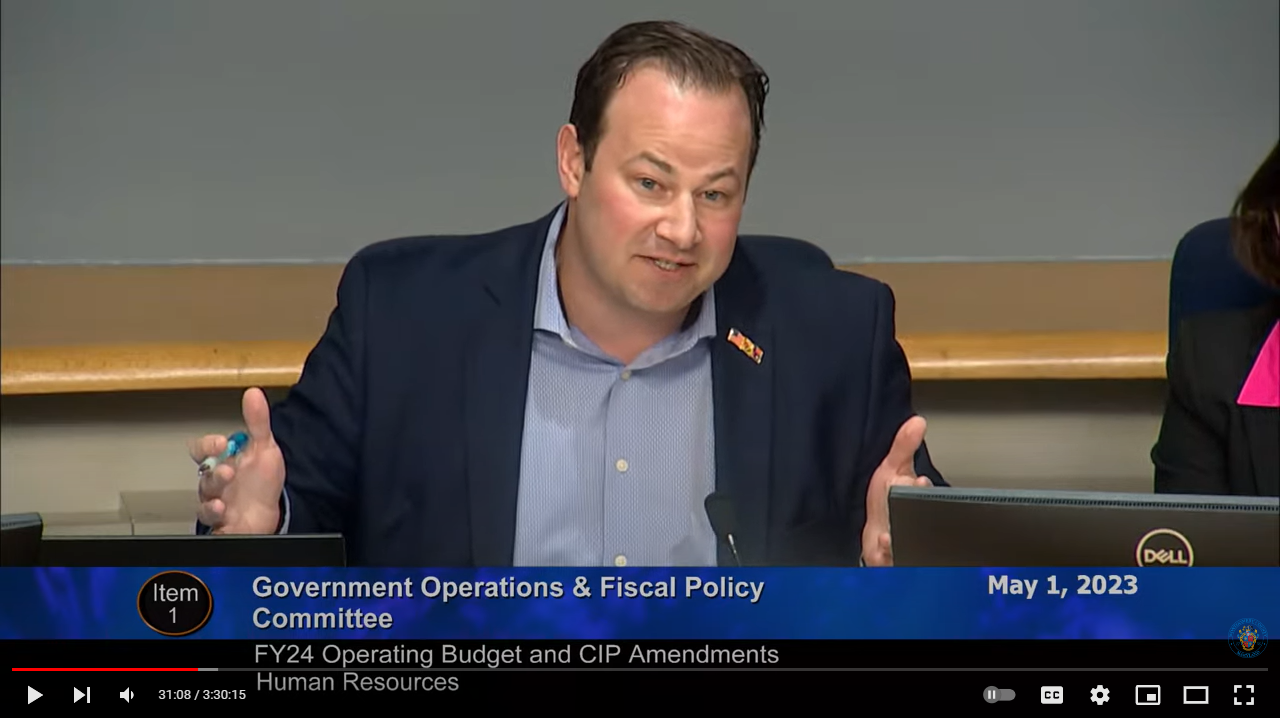By Adam Pagnucco.
Of all the elected officials I have met, Council Member Andrew Friedson is one of the best at explaining complicated matters in terms that anyone can understand. That ability is a good one to have in politics. That’s why I was surprised to hear him make this statement at a recent county council committee meeting:
“I can’t explain that to a resident.”
I guess there is a first time for everything!
What drew this comment from Friedson was the issue of vacancies, which is under the council’s microscope at this moment. The county government has roughly 1,500 vacant positions, at least some of which are funded as if they are going to be filled regardless of whether they actually get filled. Some of these vacancies have been unfilled for a year, two years or even longer. Council Member Marilyn Balcombe recently claimed that “many positions have been open for ten years – over ten years.” One wonders how much money taxpayers have spent for these decade-long ghost employees.
Despite the existence of these vacancies, the county executive wants to create 171 new positions in county government next year, 137 of which are tax-supported, and a total of 725 new positions across all county agencies. The council has requested information on the cost of vacancies as it looks for low-hanging fruit in the budget.
And so when Traci Anderson, director of the county’s Office of Human Resources (OHR) appeared before the council’s Government Operations committee on Monday, Friedson greeted her with this statement.
I think it’s hard for anybody to understand that we have 1,500 vacancies in county government, 1,200 to 1,500, that you only have the ability currently – as you told us last time – to hire 552 people right now, meaning we are not even actively recruiting almost a thousand people. And then we have to create new positions.
I can’t explain that to a resident. Because frankly, I don’t understand it myself.
Let’s start the bafflement with OHR. In FY22, OHR’s actual general fund expenditures were $7.9 million. In this year’s recommended FY24 budget, the county executive is requesting $13.2 million. That’s a two-year increase of 67%. OHR’s full-time equivalent (FTE) positions are due to rise from 43.8 to 67.25 over the same period, a 54% increase.
Let’s hear it again about how MCPS is supposedly the sole beneficiary of the executive’s 10 percent property tax hike.
After hearing about OHR’s requested new positions – when vacancies abound all over the government like frolicking rabbits in spring – Friedson went on.

If everything’s a priority, there are no priorities. And this is a budget where everything is a priority. We’re prioritizing fixing the process for recruitment and so we have substantially increased, you know, 35 percent in personnel, 50 percent in operating expenses, this department. We have a priority of supporting our rank and file employees who are doing this work, and are working harder than ever, and so we’ve given them some of the largest compensation increases in the history of the county. We have education challenges. We’ve done huge prioritization in education. We can’t prioritize everything all at once.
And I have to be honest. I am skeptical of our ability to execute all of these improvements all at once all in this budget. I just don’t think we’re going to do it well and I think we are going to destroy our credibility with the public when we ask them to pay a significant property tax increase in order to fund us solving almost every problem all at once, which is nearly impossible to execute. And I think we’re putting ourselves in a position to fail and we’re asking residents to pay a price and setting ourselves up for them to be very upset with us when we can’t meet that standard.
On the issue of vacancies, Anderson – the OHR director – pushed back, saying that her department did not control the filling of all vacancies, that retention was a challenge as departures offset hires and that “we’re not different than any other government in the region.” Friedson responded, “We are the only jurisdiction in the region that is adding 137 new positions at a time when we have 1,500 vacancies and we’re asking residents to pay a ten percent property tax.” And so the debate went on.
Let’s end with this recent comment from Council Member Dawn Luedtke in a full council session.
Because we’re appropriating funds, it’s really just a shell game for positions that aren’t going to be filled, that aren’t really there, that haven’t been there for a very long time. And then that’s money going out the door to things that we didn’t say yes to. Or that we may spend an inordinate amount of time over the next few weeks trying to trim and then they go ahead and spend it anyway. That’s not good fiscal management.
Here is one thing I have in common with Friedson: I can’t explain that to a resident either.
Can the county executive?
Can anyone?
